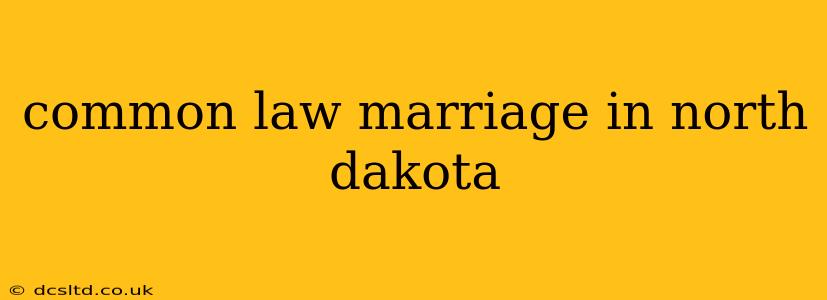North Dakota, like many states, has a rich legal history. However, when it comes to common-law marriage, also known as informal marriage, the state's stance is clear: North Dakota does not recognize common-law marriages. This means that simply living together, even for an extended period, and presenting yourselves as married to others does not legally constitute a marriage in the state. This article delves deeper into the intricacies of this legal aspect, addressing common questions and concerns.
Does North Dakota Recognize Common-Law Marriages Formed in Other States?
This is a crucial point of clarification. While North Dakota does not permit the creation of common-law marriages within its borders, it does recognize valid common-law marriages that were legally formed in other states. If a couple established a common-law marriage in a state that allows it (such as Colorado or Iowa, for example), North Dakota will generally acknowledge that marriage for purposes of inheritance, property division, and other legal matters. However, it's vital to provide clear and irrefutable proof of the existence of the common-law marriage in the other state.
What Constitutes a Valid Common-Law Marriage in States That Recognize It?
For readers curious about common-law marriage in general, and for those who may have established a marriage in a state where it's legally recognized, understanding the requirements is critical. Generally, states that recognize common-law marriage require a combination of the following:
- Agreement: The couple must have a mutual agreement to be married. This isn't a formal ceremony but a clear understanding between the parties that they are husband and wife.
- Cohabitation: The couple must live together as husband and wife.
- Public Representation: The couple must hold themselves out to the public as being married. This often involves telling friends, family, and neighbors about their marriage and acting like a married couple.
What Happens if a Couple Separates After Living Together for Many Years in North Dakota?
If a couple separates after years of living together in North Dakota, their legal standing is different than that of a formally married couple. They will not be subject to the same property division laws as a married couple going through a divorce. Instead, the distribution of assets and any other legal issues would be determined based on contracts, ownership, and other legal frameworks, potentially involving civil court proceedings.
How Can I Prove a Common-Law Marriage in a Different State?
Proving a common-law marriage in another state that recognizes it, for purposes of recognition in North Dakota, can be challenging. Strong evidence is crucial. This typically includes:
- Witness Testimony: Statements from friends, family, or neighbors who can attest to the couple representing themselves as married.
- Joint Bank Accounts and Financial Records: Documents showing joint ownership of assets, shared bank accounts, and joint tax filings.
- Joint Property Deeds and Titles: Proof of joint ownership of property, cars, or other significant assets.
- Letters and Correspondence: Any written communication referring to each other as husband and wife.
- Photographs: Pictures showing the couple together at events or family gatherings.
What are the Implications of Not Having a Legally Recognized Marriage in North Dakota?
The lack of legal marriage in North Dakota has significant implications concerning:
- Inheritance: Without a legally recognized marriage, inheritance rights are governed by intestacy laws (dying without a will). The surviving partner may not inherit property.
- Healthcare Decisions: A spouse typically has authority to make healthcare decisions for an incapacitated partner. This right is lost without a legal marriage.
- Spousal Support: In the case of separation or death, there is no legal basis for spousal support or survivor benefits.
- Tax Implications: Married couples receive different tax treatment. Those in informal relationships do not receive this advantage.
It's crucial to consult with an experienced North Dakota attorney for guidance on specific situations related to cohabitation and property rights. This information is for educational purposes only and does not constitute legal advice.
